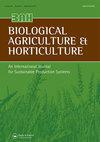Socio-technical system analysis of indigenous crop production practices for banana (Musa spp.)
IF 1.6
4区 农林科学
Q3 AGRONOMY
引用次数: 1
Abstract
ABSTRACT The present study, undertaken in the state of Kerala, India, documented 111 Indigenous Crop Production Practices (ICPPs; traditional practices) for banana and most of the practices were registered in the technology dimensions of seeds and seedlings (19%), manuring (19%), and planting in main field (15%). Of the 111 practices, 35 were selected for analysis of rationality, and for knowledge and adoption among farmers. Of the 35 practices, 27 (77%) were rated as rational and the scientific rationale/operational principles were elucidated in the study, revealing a strong scientific base for these practices. The knowledge of and the adoption of these traditional practices by farmers was found to be good. The effectiveness of the practices, as perceived by the farmers who had adopted them, were analysed for 21 practices, and it was found that majority (86%) of the traditional practices for banana production were effective. The study revealed that many indigenous practices for banana were both rational and effective. These practices require urgent attention in order to integrate them with modern technologies, which in turn would promote sustainable crop production and maintenance of ecosystem integrity. Abbreviation: ITK: indigenous technical knowledge香蕉(Musa spp.)地方作物生产实践的社会技术系统分析
摘要本研究在印度喀拉拉邦进行,记录了111种香蕉本土作物生产实践(ICPP;传统实践),其中大多数实践在种子和幼苗(19%)、施肥(19%)和主田种植(15%)的技术维度上进行了登记。在111种做法中,选择了35种做法进行合理性分析,并在农民中进行了解和采用。在35种做法中,27种(77%)被评为合理做法,研究中阐明了科学原理/操作原则,为这些做法奠定了坚实的科学基础。农民对这些传统做法的了解和采用被认为是有益的。对采用这些做法的农民所认为的21种做法的有效性进行了分析,发现大多数(86%)香蕉生产的传统做法是有效的。研究表明,许多当地香蕉种植做法既合理又有效。这些做法需要紧急关注,以便将其与现代技术相结合,从而促进可持续的作物生产和生态系统完整性的维护。缩写:ITK:本土技术知识
本文章由计算机程序翻译,如有差异,请以英文原文为准。
求助全文
约1分钟内获得全文
求助全文
来源期刊
CiteScore
3.30
自引率
6.70%
发文量
18
审稿时长
>36 weeks
期刊介绍:
Biological Agriculture & Horticulture aims to act as the central focus for a wide range of studies into alternative systems of husbandry, and particularly the biological or organic approach to food production. The Journal publishes work of a sound scientific or economic nature related to any aspect of biological husbandry in agriculture, horticulture and forestry in both temperate and tropical conditions, including energy and water utilization, and environmental impact.

 求助内容:
求助内容: 应助结果提醒方式:
应助结果提醒方式:


